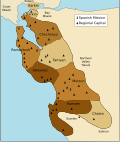User:Babbage
TODOs
[edit]- User:Babbage/Fauquier_White_Sulphur_Springs
- https://en.wikipedia.org/wiki/Votic_languages - references
To Translate
[edit]Bios of linguists
[edit]User:Babbage/Bios of linguists
Graphics and maps
[edit]-
Languages of Bhutan.
-
Pre-contact distribution of native languages of California.
-
Salinan language.
-
Pomoan languages.
-
Montana Indian Reservations.
-
California Geomorphic Provinces.
-
Tibetan script.
-
Ohlone languages.
-
Maiduan languages.
-
Ethiopia Harar map (Amharic)
-
Maya script reading direction.
The other problem there is that building out the phonology charts is a HUGE PAIN IN THE NECK. I have no idea how people can stand to produce those things without some sort of tool. I guess people start with existing charts & edit those, but there has _got_ to be a better way.
Wikipedia:WikiProject_Native_languages_of_California
translations i did
[edit]From Portuguese
[edit]- IBOPE
- Teresina
- Enéas Carneiro
- Padre Anchieta Foundation
- Luís da Câmara Cascudo
- Seu Creysson
- Sousas
- Camelô
- Lia Wyler
- António Augusto Carvalho Monteiro
- Palácio da Regaleira
- Casas Bahia
- Festa do Peão de Boiadeiro
- São Domingos do Capim
- Piracema
- Tião Viana
- Itautec
- Giovanni Gazzinelli
- Giuseppe Cilento
- Elon Lages Lima
- Grupo de Operações Especiais (Brazil)
- ABNT
- Guaíra (São Paulo)
- Eduardo Viveiros de Castro
- Brazilian Linguistics Association
From Spanish
[edit]From French
[edit]stuff i started
[edit]I keep this list so I can occasionally see if someone has made an improvement to an article I started.
- Seger Ellis jazz pianist
- Naked Eyes bad 80s band
- Takako Minekawa musician
- Kawaiisu language
- Mary Haas linguist
- LaVerne Jeanne linguist
- Hassan al-Turabi politico
- William Strachey mr tempest
- W. O. Ayres fish aficionado (an afishanado?)
- Birds of America (book) big expensive bird book
- Zubizuri a little bridge in Bilbao
- Language Bank
- Building 20
- Elizabeth Blair Lee
- Glosas Emilianenses
- Utendi wa Tambuka
- David Appleyard Ethiopianist
- Birhor language
- Ellavina Perkins Navajo linguist
- Paul Platero Navajo linguist
- Lucio and Simplicio Godina
- Washington Matthews
- Wheeler Hall
- Henry Voth
- Fort Stevenson
- Fort Rice
- Hidatsa language
- Logba people
- Lake Fianga
- Stalin (1992 film)
- The !!!! Beat
- Parecis plateau
- Zelus (genus)
- Ain't That a Kick in the Head?
- Malgudi Subha
- Center for Applied Linguistics
- Île Verte (Grenoble)
- Île Verte
- Aggavamsa
- Roger Anger
- Martinus Thomsen
- Passiflora actinia
- Meade Roberts
- Ogba language
- Itacarezinho Beach
- Touré Kunda
- Eduardo Viveiros de Castro
- Doris McLemore
- Laienspiegel
- Gaustadt
- Bronbeek
- SS Ideal-X
- Port of Durban
- New Classical Adventure
- Martin Haselböck
- North American Conference on Afroasiatic Linguistics
- David Appleyard
- Brazilian Linguistics Association
- Lucian Scherman
- Paul Platero
- Ellavina Perkins
- Michael Radulescu
- Theodore B. Fernald
- Tunica (language)
- Peter Tetteroo
- Desmond C. Derbyshire
- Birds of America (book)
- Rui Costa Pimenta
- John Ohala
- Petty Harbour
- Hassan Kazemi Qumi
- Ain't That A Kick In The Head?
- Loretta Kelsey
- Tony_Tillohash
- Canelo,_Arizona
- Edwin_Benson
- Survey_of_California_and_Other_Indian_Languages
- Andrew_Garrett_(linguist)
- Hidatsa_language
- Fort_Rice
- Fort_Stevenson
- Henry_Voth
- Wheeler_Hall
- Washington_Matthews
- Lucio_and_Simplicio_Godina
- Sally Noble
- William Shipley (linguist)
- Robert Heizer
- Samuel Barrett
- Mount Pleasant Classical Institute
articles of which i am fond to an utterly absurd degree
[edit]categories i started
[edit]Category:Earliest_known_manuscripts_by_language
Category:Writing systems without word boundaries
language stuff
[edit]- Portal:Language
- The Spanish Translation of the Week
- meta:Translation of the week
- Wikipedia:WikiProject_Endangered_languages whoa, cool
- User:AlexNewArtBot/LinguisticsSearchResult really interesting bot that looks for new articles related to linguistics
- Category:Translation_requests not specified by language, hmm. still, simpler than the request board...
languagey people on Wikipedia
[edit]For my future perusal...
· User:Taivo · User:Mark Dingemanse · User:Kwamikagami · User:CJLL Wright · User:Ish ishwar · User:Miskwito ·
notes to self
[edit]hello, self
Wikipedia:Editor's index to Wikipedia Help:User_style
http://en.wikipedia.org/wiki/User:Babbage/monobook.css
my bookshelf
[edit]The new Pediapress book functionality is really fun. Here's my bookshelf
critical trivia
[edit]The first edit I made was adding an and. ☺
| This user is a Buddhist. |
old stuff
[edit]| 22 March 2025 |
|














